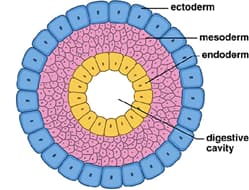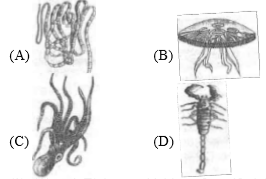Classification of Animals
Classification of Animals: Overview
This topic covers concepts such as Complete Digestive System, Incomplete Digestive System, Closed Circulatory System, Asymmetry, Animal Kingdom, Basis of Classification of Animals, Levels of Organization in Animals, Schizocoelomates, etc.
Important Questions on Classification of Animals
Organisms, attached to substratum generally possess
Which one of the following groups of structures/organs have similar function?
Which is the correct order of evolution?
In some animal groups, the body is found divided into compartments with at least some organs/organ repeated. This characteristic feature is named
Match the following list of animals with their level of organisation.
| Division of Labour | Animal |
| A. Organ level | I. Pheretima |
| B. Cellular aggregate level | ii. Fasciola |
| C. Tissue level | iii. Spongilla |
| D. Organ system level | iv. Obelia |
Determine the correct match showing division of labour with animal example.
Match the following:
| List I | List II | ||
| A | Cuttle Fish | I | Green glands |
| B | Devil Fish | II | Medusoid form |
| C | Cray Fish | III | External shell |
| D | Jelly Fish | IV | Internal shell |
| V | Shell is absent |
Study the following statements
A) Triploblastic animals are usually biradially symmetrical
B) Certain organs in vertebrates are covered by parietal peritoneum only on their ventral side.
C) Pancreas is an example for holocrine gland
D) Elastic cartilage is found in the wall of Eustachian tubes
Select the correct statements
Statement (S) : Bilaterally symmetrical animals are less efficient than the other animals in seeking food and locating mates because of cephalization.
Reason (R): Cephalization is developed in bilaterally symmetrical animals.
The correct answer is:
Statement : Symmetry of an organism is determined based on the symmetry of the early developmental stages and not that of the adults.
Reason : Bilaterally symmetrical animals are more efficient in seeking food, locating mates and avoiding predators.
Which of the following is true?
Which animals become asymmetrical due to torsion in body and shell?
The cross-section of the body of an invertebrate is given below. Identify the animal, which has this body plan?

All flatworms differ from all roundworms in having
Which of the following is a correct sequence of decreasing order of number of species?
Animals which are active at night are called
All of the following statements about bilateral symmetry are true, except
Match the following and select the correct option.
| Column I | Column II |
| A. Organ level | 1. Pheretima |
| B. Cellular aggregate level | 2. Fasciola |
| C. Tissue level | 3. Spongilla |
| D. Organ system level | 4. Obelia |
Which feature is common in chordates, arthropods, annelids and mollusc?
Observe the shown animals (A), (B), (C) and (D). Choose the correct answer with respect to a common characteristics of two of these animals.

